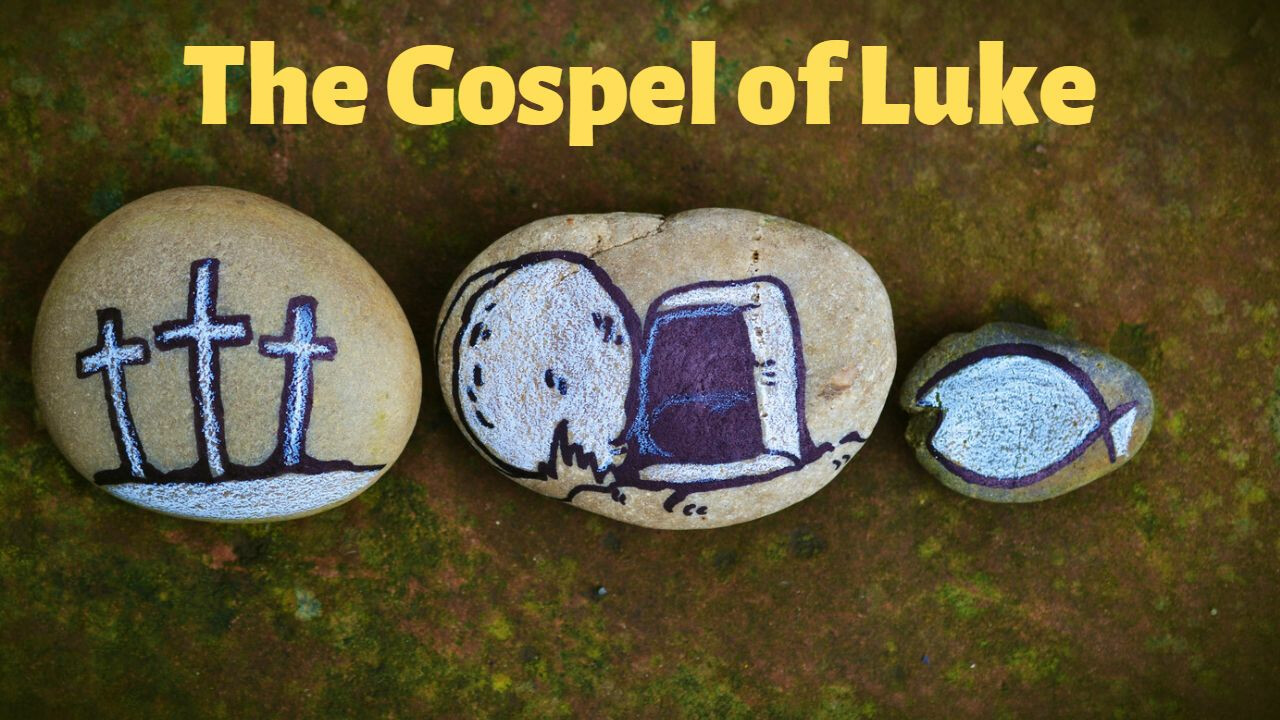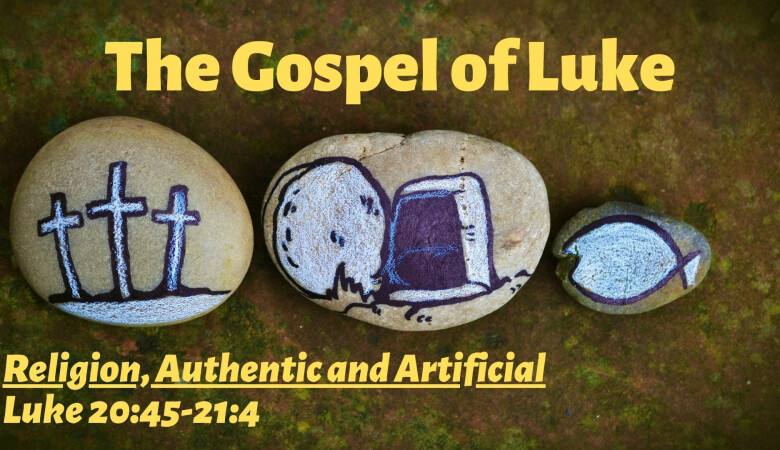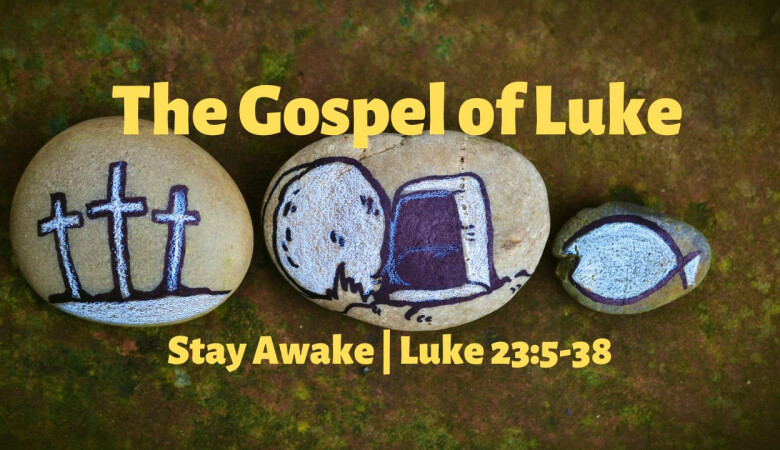Series: Luke
Jesus on Trial, Part 1
February 25, 2024 | Peter Rowan
Passage: Luke 22:63-71
ALL SERMONS IN SERIES
Summary
What do religious people make of Jesus? And in a more specific way, what do the Christian religious people make of Jesus? After all, the Jews were God's people. And it was the Chief Priest and Scribes and elders that had him arrested and are now putting him on trial. What do they make of him? And what do religious people today make of him? The truth is, that Jesus is first put on trial by his own people, and most specifically he is put on trial by the religious leaders who should have known better. And what does that say to us today? Well, it says an awful lot. It says a lot about fake religiosity and the grabbing for power. It warns us against complacency and the very real possibility that our theology and our positions can get in the way of a real relationship and a true worship of the true God. There is a lot of danger in being religious and in being powerful.
Transcript
Why do you follow Jesus? Why do you follow Jesus?
Or maybe some of you don’t and so it’s a different question for you: Why do you not follow Jesus?
Maybe you once did and now you no longer do.
Or maybe you are here in this space at this church this morning because someone brought you along and they’ve been bringing you along for a while now and you can’t bring yourself to tell them you are kind of done with it all. You’ve had your fill of Jesus, he’s taught you enough and now you think it is time to move on.
I want to suggest to you this morning that there are an awful lot of religious people that are in this whole Christianity business for themselves, for what they can get out of it, for how they can use Jesus. How he can be convenient for them.
Think back with me just two weeks ago to the arrest of Jesus. There was a crowd that came to the garden where Jesus had been praying and that crowd that wielded swords and clubs was lead by Judas. Jesus, you’ll remember spoke to Judas, “Will you betray the Son of Man with a kiss”, but most of his words were for the others in that crowd. And who were they? Well, they were the chief priests, the officers of the Temple, Luke tells us, and the elders. And Jesus says this to them: “Have you come out as against a robber, with swords and clubs? 53 When I was with you day after day in the temple, you did not lay hands on me.” They were willing to let Jesus teach and all around the Temple - after all, he drew huge crowd to their place!, but when it really came down to it, when he became a threat to their life and their livelihood, they wanted him out. Jesus as convenience.
I mentioned a few weeks ago Ayaan Hirsi Ali among the many atheists that have given themselves to Christ. After suffering genital mutilation as a young girl, she escaped Islamic fundamentalism and an arranged marriage and found refuge in the Netherlands, where soon after 9/11 she became an atheist. She publicly disavowed Islam specifically because it was and is so oppressive to women. She became one of the great faces of the New Atheism movement at the time along with folk like Richard Dawkins Sam Harris and Christopher Hitchens. She was elected to the Dutch Parliament in 2003 and the next year one of her collaborators, the film maker, Theo Van Gogh, was violently murdered by a muslim extremist. On his body was pinned a note saying that she would be the next to die. But she was resolute in her rejection of Islam and in her newfound atheism. She published the books Infidel and Nomad, telling of her story and her conviction that God doesn’t exist. But this November she wrote an essay telling about a new conversion. This essay was titled “Why I Am Now a Christian”. And of course it is incredibly interesting for someone with such a story, someone that had such a prominent voice over the last two decades for atheism, to now say that she is a Christian. Now, I don’t know the heart, I cannot search her heart. I appreciated very much here essay, but I don’t know how genuine her newfound faith is. There was a good deal of backlash to her essay and I want to tell you why. Her subtitle was “Atheism can’t equip us for civilizational war” and she has already been known for largely arguing for atheism based on civilizational war. And now this essay seemed to take on the same kind of instrumentalist approach to Christianity - what can it do for the ends that I desire? And the big thing is that she never once mentioned Jesus in this essay about converting to Christianity but did say statements like this:
"That legacy (Judea-Christian) consists of an elaborate set of ideas and institutions designed to safeguard human life, freedom and dignity — from the nation state and the rule of law to the institutions of science, health and learning. As Tom Holland has shown in his marvelous book Dominion, all sorts of apparently secular freedoms — of the market, of conscience and of the press — find their roots in Christianity."
Now, I agree with that statement entirely, but the critique that her essay received seems warranted: Is she just saying that she is a Christian for what it can bring her? Is she just engaging with Jesus for what she can get from him? is she just claiming Christianity because it backs up what she already believes in?
Turn with me to the meditation page inside the front cover of your bulletin. This is a quote from C. S Lewis’ famous book The Screwtape Letters. In that book an older demon is writing to a younger demon about how to temp the younger demons “patient".
We do want, and want very much, to make men treat Christianity as a means; preferably, of course, as a means to their own advancement, but, failing that, as a means to anything––even to social justice. The thing to do is to get a man at first to value social justice as a thing which the Enemy [God] demands, and then work him on to the stage at which he values Christianity because it may produce social justice. For the Enemy will not be used as a convenience. Men or nations who think they can revive the Faith in order to make a good society might just as well think they can use the stairs of Heaven as a short cut to the nearest chemist’s shop. Fortunately it is quite easy to coax humans round this little corner. Only today I have found a passage in a Christian writer where he recommends his own version of Christianity on the ground that ‘only such a faith can outlast the death of old cultures and the birth of new civilisations.’ You see the little rift? ‘Believe this, not because it is true, but for some other reason.’ That’s the game.
- C. S. Lewis, The Screwtape Letters
Now, Lewis was a big advocate for social justice, but his point is immensely important. One of the great temptation is to just use God, to use Christianity, to use the name of Jesus for our gain, for our purposes, for our own ends, for the things we already value.
Our passage in Luke gives us two short narratives and I think both of them are at least getting at this idea of engaging with God for our means.
The first gets at the idea of engaging with God for our strength, to demonstrate some sort of ability that we have.
63 Now the men who were holding Jesus in custody were mocking him as they beat him. 64 They also blindfolded him and kept asking him, “Prophesy! Who is it that struck you?” 65 And they said many other things against him, blaspheming him.
This is an ugly scene, it is maybe like the person who gets into the police force for all of the wrong reasons, to show off some kind of machismo, to wield a gun, and to project some kind of strength. Jesus had been arrested, he was awaiting the beginning of his trial, and these men who had clubs and swords that arrested him were watching over him. He had done great things, they had probably seen crowds gathering around him that very week in and around the Temple and they had no doubt heard how he had healed the sick, but now he was under their authority, under their control. And they took this opportunity to use Jesus. They are like the bully that projects a false strength by making fun of other kids. They have Jesus in their custody and he isn’t going anywhere and they decide that this is their opportunity to show off. It’s a sad sad way to engage with God, but it’s not foreign to us. I mean, Christopher Hitchens mocked Jesus and gained an enormous platform. He called Jesus “Santa Clause for adults.” And I have overheard plenty of conversations in coffee shops where people have mocked Jesus and Christianity to the amusement of those around them. So these men who were holding Jesus in custody were using Jesus, using Jesus to project their strength.
Look with me down at the next little section.
Here we don’t see an engagement with Jesus for the sake of using him to project our strength, but we see an engagement with Jesus to protect power.
66 When day came, the assembly of the elders of the people gathered together, both chief priests and scribes. And they led him away to their council, and they said, 67 “If you are the Christ, tell us.” But he said to them, “If I tell you, you will not believe, 68 and if I ask you, you will not answer.
This is typical Jesus in a way. He often doesn’t answer people’s question. He often answers them with a question of his own. But it is always because he is seeing what is really going on. And what is going on here is they are engaging with Jesus to keep their power. They are seeking to trap him in the idea of a messiah. “If you are the Christ, tell us.” “Christ is simply the Greek word for Messiah.” And we know for Flavius Joseph’s work The Jewish Wars (written around the year 75) that there were about a dozen other “Messiahs” around the time of Jesus and nearly all of them were done away with by the Romans. You see, if they could categorize Jesus in the same way then the Romans could get rid of him and they could continue of with their power.
They saw this engagement with Jesus here, they saw their carefully crafted words, as a way of using him for the own ends.
It is easy to name how common this is. Look no further than our major political candidates who parade the name of Jesus for votes, or really take a deep dive into what happened at the capital on January 6 and how many “Christians” were their for their political gain. There are so so many people who either vow that they follow Jesus or want nothing to do with him because of the political power it will or will not give them. There are so many people who come to Jesus because it gives them a spiritual reason for their pet political projects, whether that be the safeguarding of human life, freedom of speech, the dignity of humanity, social justice or environmentalism. And all of those may be good, but God will not be used as a convenience.
You see, I think it is too easy to dismiss these narratives as just unruly military bravado gone amuck or religious elites just grabbing on to their power, because while that is what is happening, we are also invited in to see ourselves in these narratives.
It is the season of Lent, after all, which is a season of repentance and self-examination and preparing for the cross and the empty tomb. And we do a great disservice to ourselves if we do not ask how am I doing the same thing?! How and I just using Jesus? Am I a Christian because it is true or because of what I can get out of it? God will not be used as a convenience.
Let me just end by considering how Jesus answers these religious leaders?
He doesn’t answer their question about whether he is the Christ, but he does tell them who he is and it is the same title he had given himself when he was betrayed by Judas so that Judas could use him for his monetary gain.
This is what he goes on to say:
69 But from now on the Son of Man shall be seated at the right hand of the power of God.”
And as he once again used the title Son of Man for himself he was grabbing on to the image from Daniel 7 where it says
I saw in the night visions,
and behold, with the clouds of heaven
there came one like a son of man,
and he came to the Ancient of Days
and was presented before him.
14 And to him was given dominion
and glory and a kingdom,
that all peoples, nations, and languages
should serve him
You see, Jesus was saying, “You want to use me in this small way for your own gain. You want to categorize me so that you can use me.” He was seeing and naming that they were using God to serve themselves and he was saying, NO! That’s not the way it works! And it doesn’t work that way because I am no small tribal deity! I’m no some pet God! I’m not a God to just use or abuse at your convenience. I will not be mocked?
Why are you a Christian? Why are you not a Christian? Is it because of what you can use Jesus for or is because he is the true and living God?
Series Information

The Gospel of Luke is best described by its author in the first four verses of the book: "Many have undertaken to draw up an account of the things that have been fulfilled among us, just as they were handed down to us by those who from the first were eyewitnesses and servants of the word. With this in mind, since I myself have carefully investigated everything from the beginning, I too decided to write an orderly account for you, most excellent Theophilus, so that you may know the certainty of the things you have been taught."















